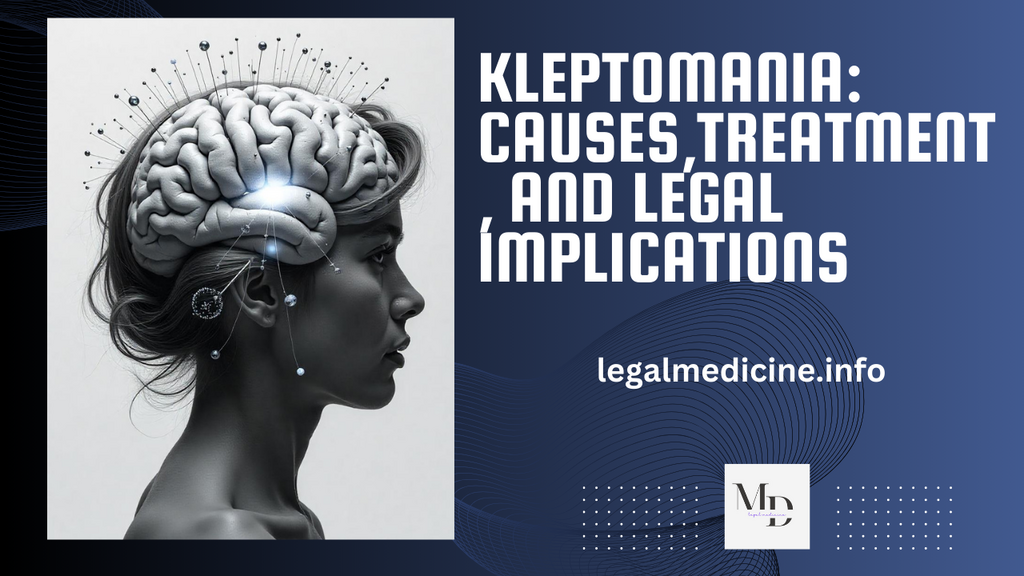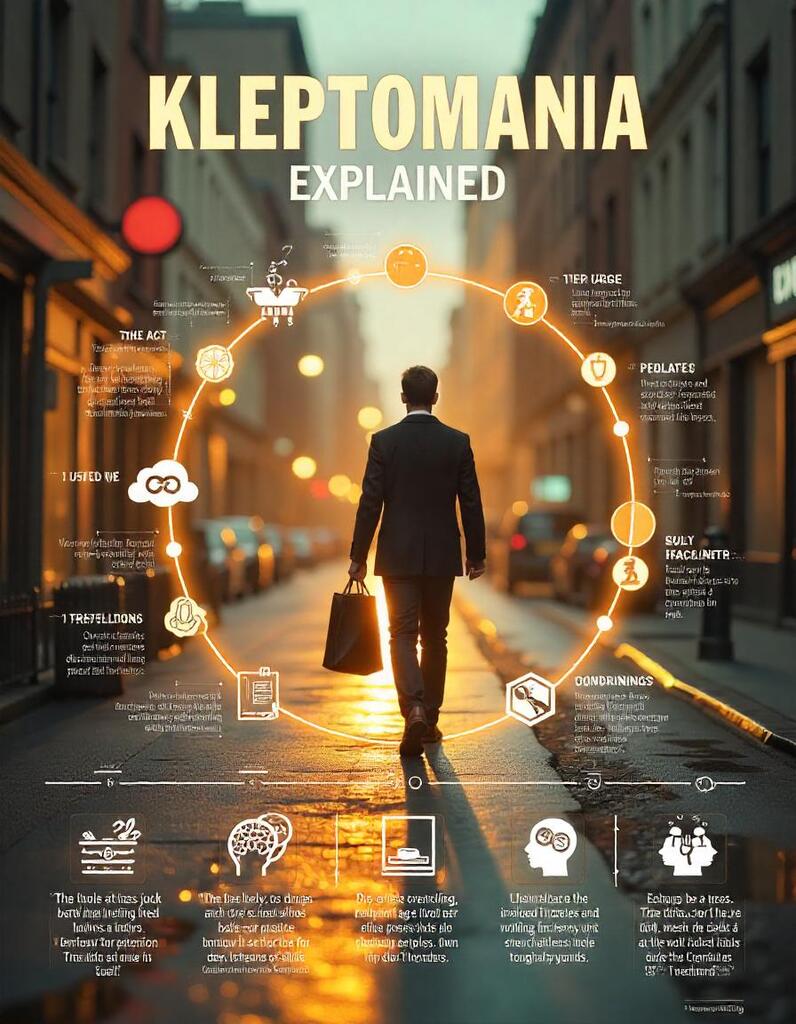Kleptomania: Causes,Treatment, and Legal Implications

Kleptomania is a serious mental health disorder that compels individuals to steal items they neither need nor find valuable. This impulse control disorder often faces misunderstanding, leading to psychological, social, and legal consequences. In this blog, we will explore the causes, symptoms, treatment options, and legal aspects of kleptomania. Additionally, we will discuss notable cases that highlight the complexities of this condition.
What is Kleptomania?
Kleptomania is a rare psychiatric disorder that causes an uncontrollable urge to steal. Unlike typical theft, which involves financial or personal gain, kleptomania stems from an overwhelming compulsion. The Diagnostic and Statistical Manual of Mental Disorders (DSM-5) classifies it as an impulse control disorder.

Key Features of Kleptomania:
- Individuals repeatedly struggle to resist stealing objects.
- Anxiety builds before the act, followed by relief or gratification afterward.
- Theft occurs without anger, revenge, or financial motivation.
- Guilt and shame often follow the theft.
- Stolen items usually end up discarded, given away, or hoarded.
Causes of Kleptomania
While the exact cause remains unclear, several factors may contribute to its development.
1. Biological Factors
- Brain Chemistry Imbalance: Low serotonin levels often link to impulse control disorders like kleptomania.
- Dopamine Dysfunction: The act of stealing may release dopamine, reinforcing the behavior with pleasure.
- Brain Abnormalities: Dysfunction in the prefrontal cortex and limbic system can impair decision-making and impulse control.
2. Psychological Factors
- Co-occurring Mental Disorders: Kleptomania frequently coexists with anxiety, depression, substance abuse, or obsessive-compulsive disorder (OCD).
- Emotional Trauma: Past traumatic experiences may lead individuals to develop kleptomania as a coping mechanism.
3. Genetic and Environmental Factors
- Family History: A genetic predisposition to impulse control disorders increases the likelihood of kleptomania.
- Childhood Experiences: Stressful childhood events, neglect, or abuse can contribute to its onset.
Symptoms of Kleptomania

Kleptomania presents several psychological and behavioral symptoms:
- Intense, uncontrollable urges to steal.
- Heightened anxiety and tension before stealing.
- A sense of gratification or relief immediately after theft.
- Persistent guilt, remorse, or fear of consequences.
- Repeated stealing despite awareness of the legal and moral implications.
- Inability to stop stealing despite multiple attempts.
Is Kleptomania a Crime?
Legally, stealing remains a crime, regardless of the underlying psychological condition. However, kleptomania presents a unique legal dilemma. Courts often struggle to determine whether individuals with kleptomania should face full accountability for their actions.
Legal Considerations:
- Many jurisdictions do not recognize kleptomania as a valid defense for theft.
- Some courts assess psychological evaluations to determine the accused’s criminal intent.
- Mental health treatment sometimes replaces punitive measures.
- Repeat offenses may still result in criminal charges, fines, or imprisonment.
Treatment for Kleptomania

Kleptomania is a chronic disorder, but individuals can manage it with proper treatment. A combination of therapy and medication often yields the best results.
1. Psychotherapy
- Cognitive-Behavioral Therapy (CBT): Helps individuals recognize and modify impulse-driven behaviors.
- Behavioral Therapy: Uses aversion techniques to reduce the urge to steal.
- Psychodynamic Therapy: Addresses unresolved emotional conflicts contributing to kleptomania.
2. Medications
- Selective Serotonin Reuptake Inhibitors (SSRIs): Help regulate serotonin levels and reduce impulsive behavior.
- Naltrexone: An opioid antagonist that diminishes the pleasure associated with stealing.
- Mood Stabilizers: Often prescribed when kleptomania coexists with bipolar disorder.
3. Support Groups and Lifestyle Changes
- Self-Help Groups: Support groups like Shoplifters Anonymous offer community support and coping strategies.
- Mindfulness and Stress Management: Meditation and relaxation techniques help control impulses.
- Family Support: A supportive environment reduces shame and promotes treatment adherence.
Notable Kleptomania Cases

Several high-profile cases illustrate the legal complexities and societal perceptions surrounding kleptomania.
1. Winona Ryder (2001)
Hollywood actress Winona Ryder faced arrest for shoplifting merchandise worth $5,500 from Saks Fifth Avenue. Her defense team argued psychological issues, though she never received an official kleptomania diagnosis. She ultimately received probation, community service, and a fine.
2. The Case of a Prominent Neurologist
A well-respected neurologist repeatedly shoplifted small items despite having ample financial resources. Psychological evaluations later confirmed kleptomania, and instead of jail time, the court mandated therapy.
3. A Case of a Housewife with No Criminal History
A middle-aged woman with no prior criminal record faced multiple arrests for shoplifting. She reported intense anxiety before stealing and relief afterward. A mental health professional diagnosed her with kleptomania, leading to therapy instead of a prison sentence.
Final Thoughts
Impulse theft disorder extends beyond mere theft, requiring compassionate understanding and professional intervention rather than punitive measures alone. While legal and ethical debates persist, seeking appropriate treatment helps individuals manage their compulsions and lead healthier lives.
For more information on Impulse theft disorder and mental health resources, visit American Psychiatric Association or National Institute of Mental Health.
FAQ questions
- Is Impulse theft disorder a mental illness or just a habit?
Impulse theft disorder is a recognized impulse control disorder, not just a habit. It involves an uncontrollable urge to steal, often linked to brain chemistry and psychological factors. - Can Impulse theft disorder be cured completely?
While there is no guaranteed cure, Impulse theft disorder can be effectively managed with therapy, medication, and support groups to reduce compulsive stealing. - What triggers Impulse theft disorder episodes?
Stress, anxiety, depression, or emotional distress often trigger episodes. Some individuals experience an increase in urges during times of personal turmoil. - Do people with Impulse theft disorder steal valuable items?
Not necessarily. Most stolen items have little or no value to the individual, and the act of stealing itself provides temporary relief rather than financial benefit. - Can Impulse theft disorder be used as a legal defense for theft?
In most jurisdictions, Impulse theft disorder is not an accepted legal defense. However, courts may consider mental health evaluations when determining sentencing.
